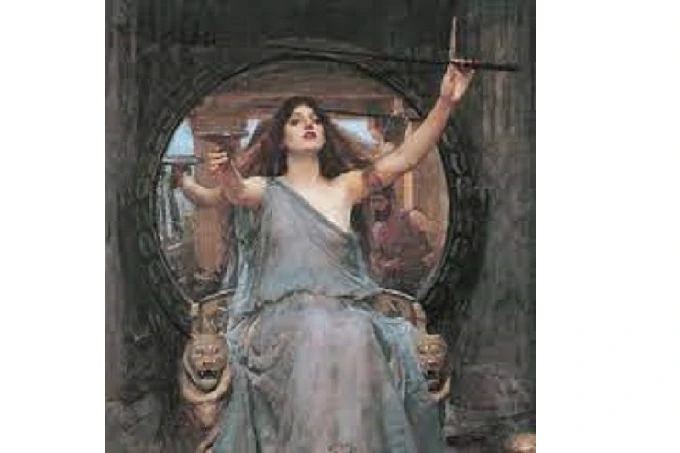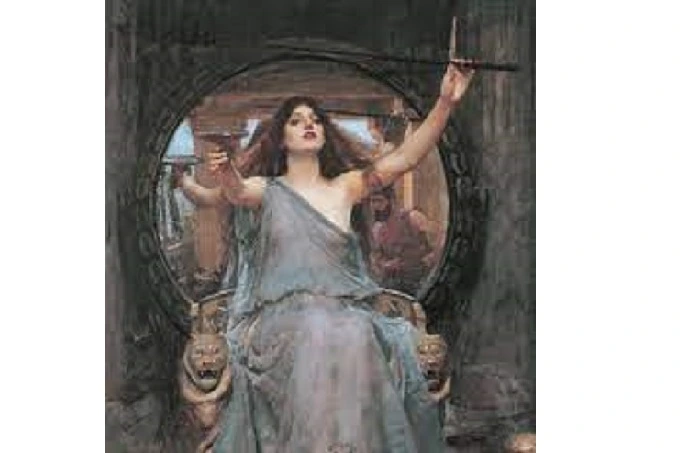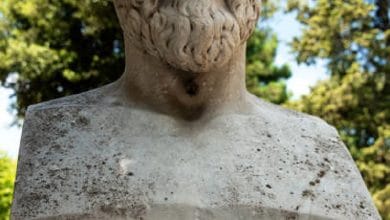Why Circe is the most attractive witch and how she charmed Odysseus

Circe, the daughter of the deity Helios and the nymph Perse, makes a brief appearance during Odysseus’ journey, but she plays a significant part in the life of the courageous hero. This character is meant to serve as a lesson to men about the strength of women and the fact that even creatures that appear weak and defenceless are capable of wreaking havoc on everything in their path, including human life. About the nature of a witch who possessed the ability to charm.
Odysseus

They arrived on the island of Aeaae not long after Odysseus and his crew had narrowly escaped being eaten by the cannibals who lived among the Laestrygones. He dispatched a group of explorers to investigate the area, and they came to the palace encircled by trees and other plants. Circe lures Odysseus’ men into her home so that she might trick them into falling into the trap she has set for them. She transforms them into pigs by giving them a drink laced with poison and waving her magic wand in front of them. But Eurylochus, one of Odysseus’ men, escapes and tells him that something terrible has occurred. Hearing what has been said, Odysseus decides to rescue his people. Hermes comes upon the brave hero as he travels to the home of Circe and assists him at that point in his journey.
He confers upon the hero a moth, a mystical plant that will defend him against the spells cast by Circe. Everything turns out just as Hermes predicted it would: Circe’s magic cannot affect the moth, and despite her best efforts, Odysseus cannot be transformed into a woman with her wand. The sorceress implores him to have mercy on her as he brandishes a sword in front of her. After that, Odysseus orders Circe to swear an oath before him, promising that from this point on, she will not cause him or his people any damage in any form. After reaching a consensus, the sorceress transforms the pigs back into people. After a year has passed, Circe gives Odysseus the advice that before he frees them, he should go to the underworld and speak with the dead to find out what his next move should be.
Circe

The most well-known witch from Greek mythology is called Circe. The picture of Circe contains elements of many qualities that would eventually be assigned to the witch figure in later works of literature. Still, these elements are already present in the original story. It would be more accurate to refer to her as a sorceress who possesses the capacity to charm. How the spell is cast varies according to the specific brand of magic that she employs to achieve her goals. Circe fabricates magical concoctions by combining various plants and herbs. As a result, she possesses a wealth of information regarding the natural world.
Circe had a deep relationship with nature even before she made her debut, as evidenced by the fact that her palace is surrounded by verdant flora and protected by various wild animals. However, the sorceress also has a great deal of influence over the natural world. She makes potions out of plants and flowers and has tamed these wild animals. The vast cultural connection between women and the natural world is reflected in the close relationship that woman has with the natural world. The primary explanation for this symbolism may be traced back to the female body and its role in the process of giving birth to new life.
There is a clear emphasis placed on the woman’s body in portrayals of ancient women who engaged in magical practices connected to s*xual desire. Circe desired Odysseus with every fiber of her being, which is why she made a promise to protect him and his people from harm. She did this because she knew this was the only way to get the hero into bed with her. Odysseus is in even greater danger in this scenario than his people are because, as Hermes forewarned, his close relationship with Circe has the potential to render him more vulnerable and less able to defend himself. The explanation for this can be found in the fact that Circe upends the socially accepted role of a male as an active participant in s*xual activity. She endangers Odysseus’ manh0od with her deeds and endangers the traditional normative roles of men and women in intimate relationships within the culture of classical love.
Femme fatale

For an entirely different reason, Circe undermines the conventional gender roles and expectations that are connected with being a woman. Within the family context, there is no question that she holds the position of authority. She has no father, brother, or spouse; she lives on the island of Aeaea by herself with the monsters that she has tamed instead. Women similar to her were thought to be illogical and unable to control their intimate and lusty urges; hence, over time, people began to refer to such women as “witches.” In a culture that was built on the principles of patriarchy, these women stood out as anomalies. They were considered to be hazardous because they inverted the natural order, which is that males should command and women should submit.
The character of Circe in the Odyssey makes it possible to analyze the structure of Greek society with respect to gender roles. Her first vision saw her singing, weaving, and showing the people of Odysseus hospitality. She also offered them food and drink. These were the kinds of pursuits that a true woman and wife ought to have time for. At the same time, Circe is a concubine who utilizes the allure of her sexuality to entice men into the trap she has set for them. She can change the men she does not like while at the same time wooing the men she does like. She becomes aware of her ability to enchant and employs it on Odysseus, causing him to lose the desire to return to Ithaca. Therefore, Circe is the harlot who can cause the hero to forget about his family and wife. As a result, she embodies the archetype of the femme fatale, endowed with the power to excite and satisfy men’s ardours and energy.
Circe is a threat to the patriarchal order because she does not submit to male authority and because she lives independently from men. However, it is important to remember that in the Odyssey, she is feared more for the fact that she is a free woman than for the fact that she is a sorceress. Her knowledge of medicinal plants and alchemical concoctions makes her sensible rather than insane. However, Circe’s witchcraft is intrinsically related to her femininity, which is why her skill is hazardous. Within the framework of the dual logic that served to build ancient Greek society, the concept of a woman was synonymous with otherness. The woman poses a challenge to the existing order, which is more closely associated with the concept of the man. Public order must be restored whenever the power of men is in danger.
Because of this, in the Odyssey, Circe is ultimately defeated by Odysseus, and as a result, she matures into a kind-hearted hostess and an honourable woman. After Odysseus successfully refutes Circe’s argument with the help of a moth, he threatens her with a sword, at which point Circe falls to her knees and begs for forgiveness. After that, Odysseus successfully pressures Circe into taking an oath, which grants him moral authority over her. Because of this, Circe can finally free Odysseus’ people from the enchantment she cast upon them and treat them by the standards of hospitality. Because Circe is now a respectable woman who abides by the social norms expected of a gracious hostess, Odysseus is within his rights to pursue a romantic relationship with her. Odysseus has become so accustomed to his new relationship with Circe that he has completely forgotten about Ithaca until his people remind him that they wish to return there.
Circe was no longer a threat once gender norms were reinstated; instead, she took on the role of an assistant. After this particular episode of The Odyssey, Circe’s divine nature is finally revealed to the audience. Circe is a chthonic deity member of the Titans, a dynasty of gods and goddesses that existed before the Olympic Games. Circe’s performance as Potnia Theron, also known as Mistress of the Beasts, is distinguished by her limited capacity for communion with nature and its wild aspects.
In addition, Circe’s liminality is also associated with the underworld. The island of Aeaea may be found in the east, very close to the portal that leads to Hades. Circe is able to lend her assistance to Odysseus and his crew on their upcoming expedition thanks to both her status as a witch and her divine nature. Circe advises Odysseus to make a stop in the underworld on his route back to Ithaca so that he might speak with the dead. In addition to this, she walks Odysseus through the process that he must go through in order to bring the dead back to life. Since this is the case, Circe serves not just as an assistant to Odysseus but also as his mystagogue. Mystagogues were the individuals in ancient mystery religions who were in charge of initiating new members into the clandestine rites and practices of the cult. Circe, a goddess with ties to the underworld, was able to provide Odysseus with the information he needed to proceed with his journey back home.
Conclusion
The episode with Circe in the tenth book of the Odyssey is short but full of meaning. This is no doubt a cautionary tale: men are wary of women because they have the potential to destroy the patriarchal order. The character of Circe embodies these fears: she is terrible and beautiful, and she is aware of this. Thus, Circe uses her magic and sensuality to change gender roles by becoming the main one.
Initially, she is presented as a sorceress who uses her knowledge of nature to dominate Odysseus’ people with full force. Second, she takes on the role of femme fatale, charming Odysseus and once again jeopardizing the cultural order that men should be the active partners in charge of the relationship. However, after Odysseus forces Circe to take an oath, the social position of the sorceress becomes subordinate to that of the hero. Thus, the patriarchal norm was finally restored. The restored social order allows Circe to reveal her divine nature and help Odysseus.




